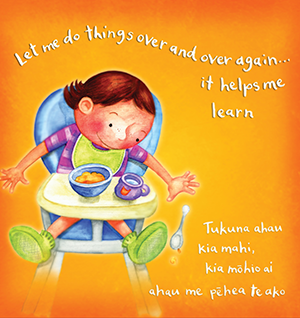
Rich learning
Rich learning comes from multi-sensory experiences, where we are using all our senses to learn about our environment.
Rich learning might give the idea that it could involve a financial cost – not so – rich learning costs almost nothing!
What it means is multi-sensory experiences – a child using what they see, hear, smell, taste and touch to learn about their environment. The only cost is an adult’s time and attention. And the returns for the child will be huge.
Everyday experiences are valuable
Young children learn from what’s going on around them – the good things, and the not-so-good things. Help parents identify how they could turn the everyday things they do at home and in their neighbourhood into valuable learning experiences for their children.
Ask whānau:
- What do you think ‘rich’ learning might mean?
- What is your little one learning alongside your whānau?
- If they could talk, what would they say about the things they enjoy doing at home? Don’t enjoy?
Parents often enjoy doing quite different things with their kids.
- Is this true in your family?
- Do you and your partner have different kinds of activities that you like sharing with your children?
- What are they?
Acknowledge the whānau for how they’re providing learning experiences for their toddler.
Making the most of a walk
A simple walk down the street for a toddler can be a rich learning event. Adults often don’t notice the things that little children notice. Just the fact that they are closer to the ground makes a difference to what they see.
Help parents identify all the sensory learning a walk outside might give their child. Identify somewhere in the local community where they might walk to and ask:
- What are all the things that your toddler might see or hear on the way?
- What might they smell or touch? What could they taste?
- What could be the possible dangers for them as they explore in this way?
Whānau could make a list for the fridge confirming all the rich learning they’re providing for their children through simple everyday experiences. Offer some prompts if they need help:
- ‘On our hīkoi to the dairy today we…’
- ‘At the beach we saw/heard/smelt/touched/tasted…’
Helpful resources for whānau
-
Visits and outings
Ministry of Education
Play ideas from the Ministry of Education. Trips to places or visits from people can provide children with new experiences and increase their understanding of the world around them.
-
Play ideas for learning
Ministry of Education
To encourage children to become effective learners you need to allow them to decide what they want to learn. They also need the time, space and support for them to explore, experiment and try things out.












